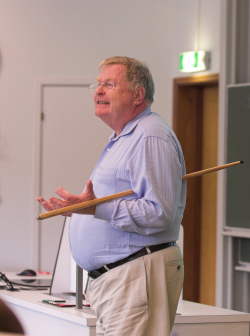Lorange's Pillars
"Fewer departments and fewer titles." This was part of Peter Lorange's doctrine when he "came home" to NHH to speak about leadership of academic organizations on Thursday 21 August.
02.09.2008 - Knut André Karlstad (translated by Jessica Hartenberger)
Lorange opened his lecture with a recollection of 1963 when he, as a member of NHH's first class in Breiviken, sat in the same auditorium as Thursday's lecture and had mathematics with professor Selmer. At the time Einar Hope and Agnar Sandmo were course assistants. Today Sandmos' name is posted over the door.
With over 20 years of experience as an executive leader with BI and IMD he shared a lot of his thoughts regarding the leadership of academic institutions, without giving a tailor-made recipe of how NHH should be run:
"I will by no means say 'this is how it should be'. But these are suggestions for what can be done."
Interaction in the classroom
Peter Lorange built the lecture on his four pillars for the leadership of academic organizations. One of his main points was that research and teaching are two sides of the same issue, and that interaction between the professors and the students is crucial.
Lorange's four pillars
Pillar 1: Strong, but practical research focus
Pillar 2: The students and participants in the classroom have a very large influence
Pillar 3: Build on modern technology
Pillar 4: What does the academic organization need in order to operate in a way that is consistent with pillars 1-3?
"We are no longer where we were with "Mr. Professor" who stands and speaks at the students. The professors today must be able to listen! It is important that we see the classroom as the other side of research. I have experienced that there are often problems getting the concept of research into the courses quickly enough. This demands that students look at themselves as responsible members of the team. Everybody shall learn. But it becomes more difficult when everyone comes from one country, and is of the same age. Here, I think NHH is on the right path," said Lorange.
Researchers are traditionally used to their work being discussed and debated in different arenas, but preferably at the professor level and in the columns in journals. Lorange is searching for more discussion and use of current work in the auditoriums.

DIFFICULT. "There is an axiomatic motive in our environment, which we have to work with," stresses Lorange.
Foto: Kristian Tindeland Marthinsen
Terrible questions
Lorange defended his stance which he had taken as rector at BI and president at IMD, but which traditionally meets resistance in academic environments. Among others he is a supporter of flatter organizational structures - fewer institutions and departments, and fewer titles.
"Many academic institutions have a great deal of internal gibberish. Things happen slowly. Too many committees, too much talking," he explained and used, among others, examples from Harvard and LBS about how breaking down barriers between the different academic fields can give results; but not without some degree of friction.
"There is an axiomatic drive in our environment, which we must work on. These are awful questions to deal with, because these are the things that lay deep within us," said Lorange.
Playing manager
Professor Victor Norman was among those in the audience who had suggestions, and interpreted Lorange's lecture as defining the role of a rector as a sort of coach.
"I think one will see more top-down leadership," said Lorange, and stressed that this is legitimate. He himself spent a great deal of time as leader going around and involving himself and Lorange was in agreement to Norman's understanding of the rector roll as an active coach.
"To be rector is a 20 hour job," he said.
Cultivate the entrepreneurs
When rector Jan I. Haaland summed up the lecture "interaction" was the key word. Peter Lorange spoke a lot about mobilizing teams of researchers.
"It is important to have research entrepreneurs in the institution and that these researchers are capable of mobilizing teams of colleagues. It is a dilemma that those who often envision new ideas do not have the capacity to work with others. Give the internal entrepreneurs a chance," was the recommendation.
Comments: Lorange's lecture
Do you have comments regarding the suggestions Peter Lorange presented on Thursday, or NHH's work with the new strategy plan?
| Tråd |
Sender |
Siste innlegg |
|

